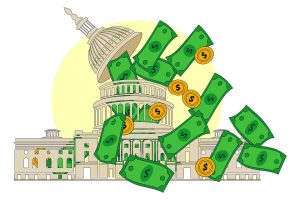RESEARCH LINKS

ARTICLE I, SECTION 6, OF THE U.S. CONSTITUTION states: “The Senators and Representatives shall receive a Compensation for their Services, to be ascertained by Law, and paid out of the Treasury of the United States.”
Issue 1: No Congressional Pay
Congress.gov: H.R.1973, “No Pay for Congress During Default or Shutdown Act”
Straight Arrow News: “Lawmakers Giving Up Paychecks During Shutdown”
Brookings Institution: “What’s the Legal Basis for Sending Troops to DC Streets?”
Fox News: “GOP Senators Say They’re Open to Deploying National Guard Blue Cities”
CBS News: “Does Congress Get Paid During a Government Shutdown?”
Democracy Docket: “Does Trump Have the Power to Take Control of American Cities?”
Issue 2: Daylight Saving Time
Congress.gov: S.29, “Sunshine Protection Act of 2025”
American Academy of Sleep Medicine: “Sleep Experts Prescribe Standard Time”
Coalition for Permanent Standard Time: “Congress Should Put Us on Standard Time”
National Sleep Foundation: “National Sleep Foundation’s 2025 Sleep in America Poll”
Farmer’s Almanac: “Daylight Saving Time 2025”
Time and Date: “Your Guide to DST 2025: When Does the Clock Change End?”
DISCUSSION QUESTIONS
Issue 1: No Congressional Pay
- Is it fair for lawmakers to receive a paycheck while many federal employees are furloughed or forced to work without pay?
- Do you think that withholding pay of congress members would be an effective incentive to avoid a government shutdown? Why or why not?
- Some members of congress have announced they are giving up their paychecks or donating them to charity during the government shutdown. If you were a member of congress, would you keep your paycheck or give it up? Why or why not?
- Does focusing on congressional pay distract from the real problem of partisan gridlock and an inability to compromise on budget matters? Why or why not?
- Could a “no pay” rule actually encourage more shutdowns? Could a shutdown be used as a political tactic to exert pressure on opponents?
Issue 2: Daylight Saving Time
- How does “springing forward” and “falling back” affect you personally? Which time zone do you prefer and why?
- Do you believe there is enough scientific consensus and public support to switch to permanent standard time or permanent daylight saving time, or should the current system continue? Why?
- How does standard time align with natural human biology, and are there any health risks associated with permanent standard time?
- What are the potential risks or benefits of permanent daylight saving time on our sleep, mood, and overall wellbeing?
- Compare and contrast the economic advantages and disadvantages of permanent standard time to permanent daylight saving time. Which is better for the economy overall? Explain your answer.

